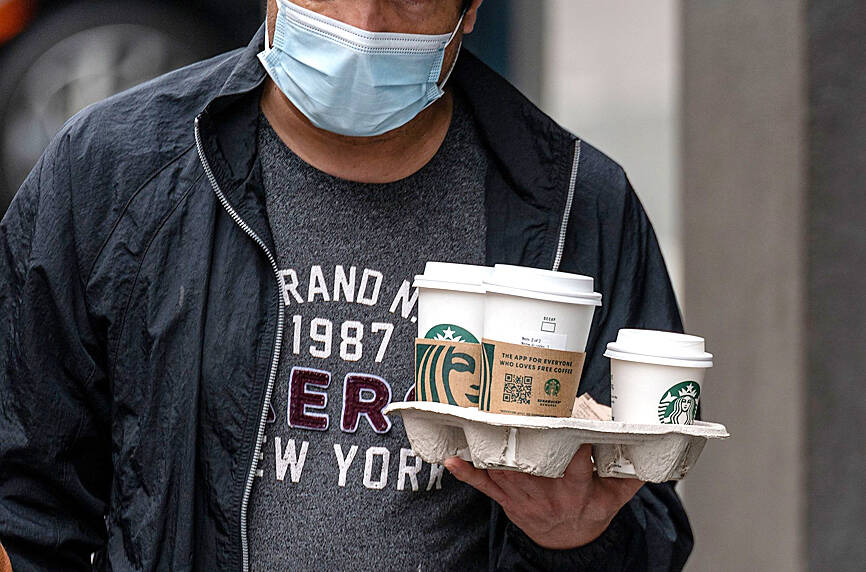Starbucks Corp reported sales that exceeded expectations, as US consumers forked over more for their lattes amid higher economy-wide inflation, driving the shares higher in late trading on Thursday.
The key measure of same-store sales rose 7 percent in the quarter ended Oct. 2 — above the average estimate of 4.1 percent global growth compiled by Bloomberg. Internationally, same-store sales shrank, but less than anticipated by analysts.
The company laid out an optimistic outlook for the next 12 months in a call with analysts.?

Photo: Bloomberg
The results show that Starbucks’ signature lattes and frappuccinos remain a luxury that consumers are willing to pay for, even if they cost more. The majority of the 11 percent comparable-store sales growth in North America was driven by an increase in the amount spent per order. There was only a slight increase in transactions, suggesting that store traffic is stable, but customers are paying more.
The company pointed to “strategic” price increases that were “primarily in North America.”
Interim CEO Howard Schultz told analysts that Starbucks is not looking to raise prices more, yet the company has not seen any impact on loyalty or orders when it increased prices before.
He added that the company’s customers have gotten younger, and those consumers have a significant amount of discretionary income at their disposal.
The shares rose 1.3 percent to US$85.81 in late trading at 5:54pm in New York, paring some gains. The stock has declined 28 percent this year through Thursday’s close.
The company expects US comparable sales to be at the high end of its prior guidance for growth of 7 percent to 9 percent this fiscal year. Starbucks also sees earnings in the period near the top of the projected 15 percent to 20 percent growth range.
Operating margin fell from a year earlier, reflecting pressure from inflation, as well as the company’s initiatives to boost pay and training for baristas, and improve equipment to make their jobs easier. The company is looking to blunt a unionization drive at its US locations by raising pay and improving benefits.
Inflation, commodity and supply-chain headwinds will continue in the current year, albeit less than last year, Starbucks said.
In China, where Starbucks has more than 6,000 stores, sales were limited by COVID-19 resurgences and government restrictions. Still, the 16 percent decline in comparable sales there was better than expected. Analysts had predicted a decrease of nearly 22 percent.
“We anticipate the current COVID-related uncertainty to continue” in China, Schultz said, adding that recent virus resurgences have “meaningfully” reduced traffic in cafes there.
However, he reiterated general optimism on the business’s trajectory there, saying Starbucks could become the No. 1 Western brand in the country due to the company’s intensive investment.

SELL-OFF: Investors expect tariff-driven volatility as the local boarse reopens today, while analysts say government support and solid fundamentals would steady sentiment Local investors are bracing for a sharp market downturn today as the nation’s financial markets resume trading following a two-day closure for national holidays before the weekend, with sentiment rattled by US President Donald Trump’s sweeping tariff announcement. Trump’s unveiling of new “reciprocal tariffs” on Wednesday triggered a sell-off in global markets, with the FTSE Taiwan Index Futures — a benchmark for Taiwanese equities traded in Singapore — tumbling 9.2 percent over the past two sessions. Meanwhile, the American depositary receipts (ADRs) of Taiwan Semiconductor Manufacturing Co (TSMC, 台積電), the most heavily weighted stock on the TAIEX, plunged 13.8 percent in

A wave of stop-loss selling and panic selling hit Taiwan's stock market at its opening today, with the weighted index plunging 2,086 points — a drop of more than 9.7 percent — marking the largest intraday point and percentage loss on record. The index bottomed out at 19,212.02, while futures were locked limit-down, with more than 1,000 stocks hitting their daily drop limit. Three heavyweight stocks — Taiwan Semiconductor Manufacturing Co (TSMC, 台積電), Hon Hai Precision Industry Co (Foxconn, 鴻海精密) and MediaTek (聯發科) — hit their limit-down prices as soon as the market opened, falling to NT$848 (US$25.54), NT$138.5 and NT$1,295 respectively. TSMC's

TARIFFS: The global ‘panic atmosphere remains strong,’ and foreign investors have continued to sell their holdings since the start of the year, the Ministry of Finance said The government yesterday authorized the activation of its NT$500 billion (US$15.15 billion) National Stabilization Fund (NSF) to prop up the local stock market after two days of sharp falls in reaction to US President Donald Trump’s new import tariffs. The Ministry of Finance said in a statement after the market close that the steering committee of the fund had been given the go-ahead to intervene in the market to bolster Taiwanese shares in a time of crisis. The fund has been authorized to use its assets “to carry out market stabilization tasks as appropriate to maintain the stability of Taiwan’s

In a small town in Paraguay, a showdown is brewing between traditional producers of yerba mate, a bitter herbal tea popular across South America, and miners of a shinier treasure: gold. A rush for the precious metal is pitting mate growers and indigenous groups against the expanding operations of small-scale miners who, until recently, were their neighbors, not nemeses. “They [the miners] have destroyed everything... The canals, springs, swamps,” said Vidal Britez, president of the Yerba Mate Producers’ Association of the town of Paso Yobai, about 210km east of capital Asuncion. “You can see the pollution from the dead fish.